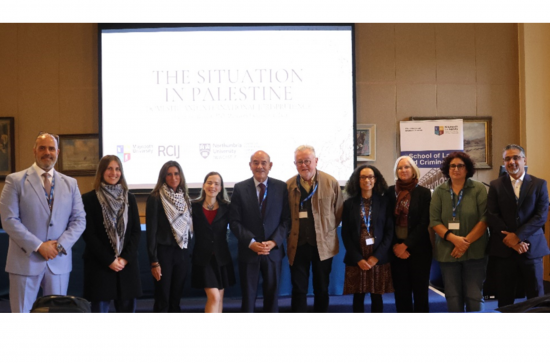
On 9 July 2024, the Maynooth University School of Law and Criminology’s Research Centre in International Justice hosted a symposium entitled 'The Situation in Palestine: Emerging Domestic and International Jurisprudence'. This hybrid and international event was jointly hosted by Maynooth University School of Law and Criminology’s Research Centre in International Justice (RCIJ) and Northumbria University Law School’s Centre for Evidence & Criminal Justice Studies.
Nine months into Israel’s war on the Gaza Strip, the daily atrocities continue and the UN food agencies are warning that half of Gaza’s population is now facing the risk of famine and death. While the situation in Palestine has long been the focus of litigation and advocacy attempts to defend Palestinian rights in multiple legal arenas, these past months have seen unprecedented developments in domestic and international courts. These include South Africa’s case against Israel at the International Court of Justice, cases against senior US and German officials respectively for complicity in genocide, governments in Europe seeking judicial review of arms export licences or a halt on the transfer of weapons and fighter jet components to Israel, complaints against funds with investments in illegal Israeli settlements for benefiting from the proceeds of crime, and attempts to initiate domestic criminal prosecutions for war crimes where dual citizenship or universal jurisdiction laws allow for such prosecutions.
To reflect on these developments and more, this symposium brought together leading practitioners and scholars of international law who have been at the forefront of pursuing and analysing this emerging jurisprudence. The event allowed for critical reflection on the situation in Palestine today and the possibilities and limits of these various legal initiatives in different judicial arenas.
The symposium comprised four panels, covering diverse themes such as international law and genocide, the framing of occupation, domination and resistance within and beyond the law, and the response to date of international courts and tribunals, and domestic courts and complaints.
Keynote presentations were delivered by Raji Sourani (founder and director of the Palestinian Centre for Human Rights in Gaza) and Professor William Schabas (Middlesex University, Leiden University).
Other speakers included Katherine Gallagher (Center for Constitutional Rights), Dr Reem al-Botmeh (Birzeit University), Tayab Ali (International Centre of Justice for Palestinians), Professor Triestino Mariniello (Liverpool John Moores University), Professor Mohamed Badar (Northumbria University), Dr Shahd Hammouri (Kent Law School), Dr John Reynolds (Maynooth University), Dr Nora Salem (German University in Cairo), Prof. Galina Cornelisse (Vrije Universiteit, Amsterdam), Sara Elizabeth Dill (Anethum Global), Gerry Liston (Global Legal Action Network) and Dr Polona Florijančič (Independent Researcher).
This event was organised by Dr Amina Adanan, Dr John Reynolds and Dr Rhiannon Bandiera of Maynooth University’s RCIJ and School of Law and Criminology, and by Prof Mohamad Badar of Northumbria Law School and Dr Polona Florijančič. The event was co-ordinated by Dr Amina Adanan.
For more information on this event, please see here.
Dr Amina Adanan is Lecturer/ Assistant Professor in Law in the School of Law and Criminology, Dr John Reynolds is Associate Professor in Law in the School of Law and Criminology and Dr Rhiannon Bandiera is Lecturer/Assistant Professor in Criminology in the School of Law and Criminology at Maynooth University, where they teach on the LL.M and MA programmes.
For more information on the work and activities to the RCIJ, please see here.
Media coverage related to this event:
Raji Sourani, appeared on the Tonight Show on Virgin Media during his time in Ireland and was interviewed by the Irish Times.
For a recording of Raji Sourani’s appearance on the Tonight Show on Virgin Media, please see here (segment starts at 27 mins).
“Palestinian lawyer Raji Sourani: ‘You cannot act like ancient Rome ... We are not the slaves of the 21st century’” (Irish Times, 11 July 2024).
